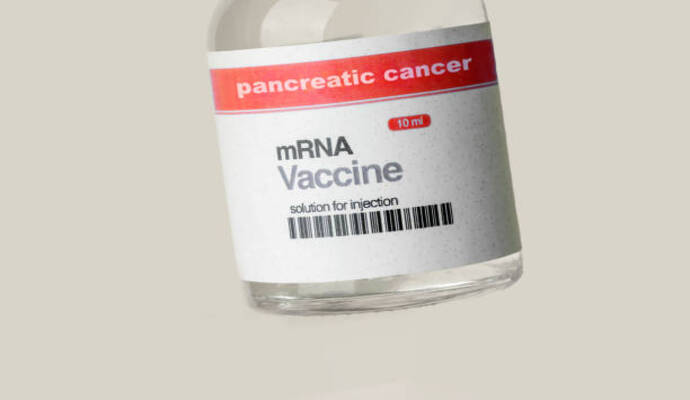Promising Results Seen in Pancreatic Cancer mRNA Vaccine Trials
A recent Memorial Sloan Kettering Cancer Center announcement revealed promising results from a phase 1 clinical trial to treat pancreatic cancer with mRNA vaccines.

Source: Getty Images
- Adding to the significant progression of mRNA vaccines in cancer care, Memorial Sloan Kettering Cancer Center (MSKCC) researchers have announced promising results from a phase 1 clinical trial using mRNA vaccines to treat pancreatic cancer. The study results published in Nature found that 50% of patients treated with the vaccine had a robust immune response.
The study was led by Vinod Balachandran, MD, a physician–scientist in the Human Oncology and Pathogenesis Program and an affiliate of the David M. Rubenstein Center for Pancreatic Cancer Research.
Participants in this clinical trial had pancreatic tumors that were surgically resected. After the operation, the researchers sequenced the tumor DNA to determine the best target for the mRNA vaccine based on each patient’s cancer. According to the MSKCC press announcement, the scientists focused on neoantigen proteins foreign to the immune system.
After a dose of the checkpoint inhibitors, patients receive the mRNA vaccine in a series of nine injections infused into the bloodstream. The treatment is supposed to trigger the immune system to recognize and attack tumor cells, preventing growth and metastasis.
Balachandran and his colleagues recruited 29 patients with pancreatic ductal adenocarcinoma (PDAC). Roughly half of the participants, 16 patients, were assigned to the mRNA vaccine — also referred to as an individualized neoantigen vaccine based on uridine mRNA–lipoplex nanoparticles. This participant group also received a single dose of atezolizumab, an anti-PD-L1 immunotherapy.
The remainder of the participant population received a modified version of the mFOLFIRINOX therapy, a chemotherapy regimen including folinic acid, fluorouracil, irinotecan, and oxaliplatin.
Within three days of treatment, half of the participants receiving the mRNA treatment had increased levels of neoantigen-specific T cells. Beyond that, researchers hypothesized that the immune response could be sustained for up to two years. Patients who had expanded T cells were more likely to remain in remission.
“These exciting results indicate we may someday be able to use vaccines as a therapy against pancreatic cancer,” said Balachandran in the MSKCC press release. “The evidence supports our strategy to tailor each vaccine to each patient’s tumor.”
